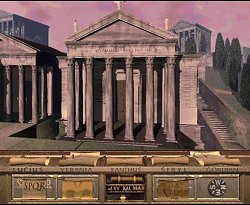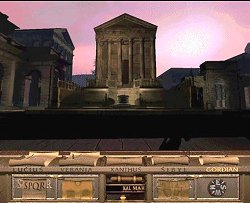|
SPQR: The Empire's Darkest Hour
 It is the year 205AD and Septimus Severus wears the purples of the Roman Emperor. Your master Cornelius has summoned you to Rome. Martial Law has been invoked and he is to be arrested. You must complete what he has begun. Someone known only as Calamitus threatens to destroy Rome by the end of the year, and you must find out who that person is and stop them.
So begins SPQR, and let me say up front that I am fascinated by ancient Rome, enjoy first person point and click games, and like reading. A healthy dose of all of these attributes will stand you in good stead for this game. It is the year 205AD and Septimus Severus wears the purples of the Roman Emperor. Your master Cornelius has summoned you to Rome. Martial Law has been invoked and he is to be arrested. You must complete what he has begun. Someone known only as Calamitus threatens to destroy Rome by the end of the year, and you must find out who that person is and stop them.
So begins SPQR, and let me say up front that I am fascinated by ancient Rome, enjoy first person point and click games, and like reading. A healthy dose of all of these attributes will stand you in good stead for this game.
Having arrived at your master's workshop in Rome, you learn from Cornelius' notes that he has narrowed the suspects down to five people. Your first task is to go to the forum and find the journal of each suspect. Through the journals, events will unfold and secrets will be revealed.
You do not, however, leave the workshop. You visit the forum via a machine invented by Cornelius called the Navitor. First though you have to get it operating, and it is prone to periodic breakdowns. Once it is up and running, travelling the streets of Rome using the Navitor is no different to navigating in any first person point and click game, except of course for the breakdowns. These will throw you back to the workshop, where you will have to work out how to get it going again in order to continue.
So far so good, even if all the buttons and levers on the Navitor take some time to work out. You can access maps of the forum, plans and cross sections of all the buildings, information in various notebooks, and even control the passage of time. This latter aspect is important, because this is a timed game. You only have until the end of the year to determine the culprit. You can slow down the rate at which time passes, or speed it up if you need to get to a particular time and place. You can even stop it, but this returns you to the workshop, effectively pausing the game.
Finding the journals involves searching and learning your way around the forum. As you go, a map will keep a trail of hotspots which you can use to jump from place to place once you have been there in the conventional way. Some places you can't go, and the cursor will let you know. It will also indicate the directions in which you can turn, including occasionally up and down. The cursor will not indicate how far you can turn though. Sometimes you will turn 90 degrees, at others you will turn completely around. I found some locations a bit hard to get to, but on the whole navigation was easy.
As you walk around, the journals (once you have found them) reveal the thoughts and actions of the writers with each passing day. It is primarily through these journals, and through Rome's "gazette", the Acta Diurna, that you will unravel what is going on. You will be assisted by notebooks which contain all manner of information about life in Rome, and by "solving" various crimes which are committed throughout the year.
Solving the crimes involves pulling together clues and information from the journals and notebooks to complete a puzzle. The nature of the puzzle itself is gleaned from the unfolding events, and will usually involve manipulating a machine of some sort to some end. Some of the puzzles are more integrated into the game than others, but all have a context within the story. They vary in complexity, some being quite difficult, but only once did one verge on the illogical. If you complete the puzzles, you will receive three items that will help you on your way. All lead toward the endgame, though some are more critical than others. More and more clues (and sometimes even the complete solution) are given through the journals.
The notebooks will helpfully flash to indicate a useful bit of information is available. For instance, stand in front of a Roman sign, and it will flash and open at the translation. The information is not always quite so obvious, but take note of it when it is presented. You can also access the notebooks at any time, and read any or all of the information. There is a wealth of detail on Roman life and society, some of it essential to solving the puzzles but most provided as historical background. One complaint I have is that whilst the books have chapters, you have to access them all from the first page, so information you might want to go back to which is on page 20 requires 20 mouse clicks.
 You will also be provided with cultural and societal information through the suspects' journals. They go about their daily lives, and comment on much of it. They also give personal insights into their fears, suspicions and darkest secrets. You will also be provided with cultural and societal information through the suspects' journals. They go about their daily lives, and comment on much of it. They also give personal insights into their fears, suspicions and darkest secrets.
Just prior to the end of the year, if you have done everything you should, you will have to decide who the culprit is, and then attempt to stop them. The ending you get will depend on how successful you have been. If Rome burns and is sacked by the Goths, clearly you failed to stop Calamitus. One tip though is to save at the point when you are asked to choose a suspect, and have a look at all the endings. My favourite resulted in shots of the recreated forum morphing into photos of what remains today.
As I said, a fondness for reading will be an attribute when playing SPQR. You must read the journals, read the Acta Diurna, read the notebooks, and use what you know to solve the puzzles at crime scenes. In fact, apart from the puzzles (one a month), and after the initial forum exploration, you do little but read. Indeed, you can stand in one spot, read the journal entries as they are written, and only move to go to the crime scene when the crime is committed. Which is why a fondness for meandering around ancient cities is also an attribute.
The problem with this wandering around is that whilst the city has been faithfully recreated, it is a pretty drab place. The overall impression is one of shades of grey. There is light and dark, and some browns, but colour is noticeably absent. Maybe that was the colour scheme of the day, and its gloominess fits the story being told, but it is not enticing, and eventually it wore me down.
Nor can you access many buildings, except at times of crime, so after a while exploration stops. I did indeed ultimately end up standing in one place waiting for time to pass.
The problem with so much reading is that whilst it is a rollicking good story that is being unveiled, a story with lashings of political intrigue, betrayal, death, corruption, ambition, longing, family squabbles and twists and turns, reading a story will only carry the game so far for many people. There is not much to do whilst you wait for the next crime.
And nor is there anyone to do it with. Despite reading about all these things that are going on, there is no one about. You never see anyone, despite all the festivals and events occurring, and despite even being able to hear them. You can visit a building site, and you can hear the sounds of building, but there is no one around. It is similar in other locations. Again, I don't generally mind a lack of character interaction, but usually it is missing because of the story you are involved in. Here, the story has people everywhere, but they aren't there. The dislocation between visuals and plot is always noticeable.
There are simple animations that occur relatively frequently, both in the journals and in the city, and you can interact with some objects just for fun. The cursor will indicate that you can interact or use some object (sometimes it in fact gives the impression that you can do more than is actually possible), and some objects will be collected in your inventory slot on the Navitor and used later. Occasionally a journal entry will be spoken (without subtitles) and not written. A soundtrack accompanies all locations, sometimes music, sometimes the sounds of the city. The game loaded easily, and is contained on one cd, so there is no swapping.
Apart from those who simply must play every adventure game, this game will appeal mainly to those who like who-dunnits, and who posses the attributes referred to above. Whichever camp you are in, you will do yourself a favour if you master the time control aspect, and use it to make things happen fairly constantly.
Copyright © Steve Ramsey 2000.
All rights reserved.
System requirements
486/66, 8mb RAM, Windows 3.1,6MB hard Disk, 256 colour, 2x CD ROM, VESA local bus or PCI video card w/ 1MB RAM, Windows compatible sound card.
Recommended: Pentium Processor, 16MB RAM, Windows 95, 16 bit colour, 4x CD ROM.
|
